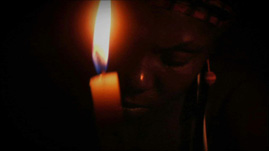Teachers' Domain - Digital Media for the Classroom and Professional Development
User: Preview


MARQUEZ: Good afternoon, everyone.
MARQUEZ: The situation is that the mayor has set the eviction date.
CARABALI: Is there a written document where we can see the mayor’s position? [OVERTALK]Yes. Yes. Is it written? – Yes.
MAN IN CHECKERED SHIRT: The mayor should tell the president that he refuses to go through with it because his neighbors have lived there for a long time, just like him. How is he going to proceed with the eviction of people who have lived here for thousands of years just like him?
MARQUEZ: We know it’s our land but the politicians don’t think that way.
NARRATOR: They decide to ask Colombia’s constitutional court to intervene to stop the eviction of La Toma’s miners. The court ruling could take months. Meanwhile … they have a more urgent problem.
CARABALI: The leaders of many human rights organizations, we have been threatened in the past couple months, much more frequently.
NARRATOR: Armed groups have been targeting them. Nearly everyone in this room has received death threats.
CARABALI: The question is, why doesn't the government denounce these threats?
NARRATOR: The threats these leaders have been receiving for the last couple of months are signed Black Eagles – “Aguilas Negras” – New Generation.
LEON: They use a lot of intimidation tactics, they put papers underneath the doors of the houses intimidating people.
LEON: You don’t even know who –who are they? They change names a lot and are basically just like basic criminals but organized as armies. And most of them have been paramilitary before and they just never demobilized.
NARRATOR: Award-winning journalist Juanita Leon has been reporting on the violence in Colombia for more than a decade. She sees a new frontline in Colombia’s war … and it’s over land and resources.
LEON: Now that there is this gold rush, a lot of multinationals coming in to explore gold, there is a lot of violence around the gold exploration. We have gone back again to the whole cycle of violence.
MARQUEZ: We've had death threats from the Aguilas Negras, New Generation, who are claiming we are opposed to development. The only thing we are opposed to is their attempts to remove us from our land.
THREAT: We’ve decided to re-ignite the fight against enemies of our democracy. They don’t allow income from the multinationals that bring benefits to the communities. Today we declare them as military targets.
MARQUEZ: We don’t understand when the government says the paramilitaries were demobilized because we are living a different reality. The paramilitaries don’t massacre large groups like they used to. Now it’s more selective and people go missing. I’m more scared for my children. I’m scared that at any moment they could grab them somewhere and hurt them.
MARQUEZ: We’re not willing to give up our land and become another one of the displaced citizens in this country who are looked upon as dirt.
NARRATOR: Between the threats and the eviction, Marquez, her family, and her neighbors, risk becoming part of Colombia’s vast displaced population … in the last eight years alone, over two million have been uprooted.
CARABALI: If they remove people from the mines they have to go to the cities, where they have no jobs, they are living with dirty water, eating whatever is left. Teenagers join gangs to rob and kill. It is the end of the family.
CARABALI: What worries us is the measures the government is taking to dispossess the communities without following the law. So in a certain way it’s government itself that is generating this problem.
 Loading Standards
Loading Standards